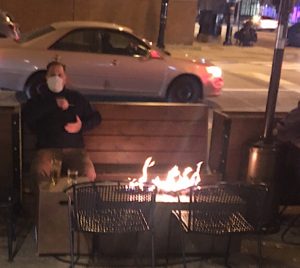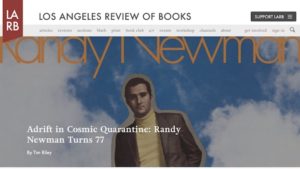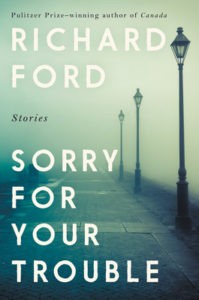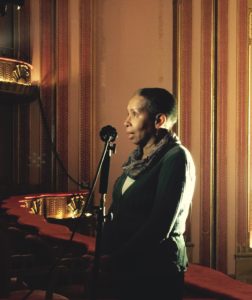Mondays with Mike: Fire works
December 7, 2020 • 10 Comments • Posted in Mike Knezovich, Mondays with MikeSave for our favorite sandwich joint Standing Room Only (which was done in by looting), the small businesses in our neighborhood are hanging on. Even the restaurants are eking by. So far.
In Chicago, bars that don’t serve food were closed by city order. Establishments with licenses to serve food have been allowed to stay open, mostly for take-out. Restaurants with sidewalk patios can continue to serve outdoors. And restaurants that have large windows can seat people at tables immediately adjacent to those open windows.
It’s December, and well, yes, our friends and neighbors are bundling up and dining

TGIF in Chicago, 2020
and imbibing al fresco or nearly al fresco.
Dining out—even outside–is a calculated risk in these times. But it’s a risk some people have been willing to take, carefully and masked, of course. Not only for mental health, but to support the proprietors of the businesses that help make our neighborhood our neighborhood.
People like the owners of Half Sour: Liz, Emily, and Jesse. They opened up only a couple years ago. Opening a restaurant/bar is a tight-rope walk without a net, but this trio has done a great job of adapting on the fly. By the start of this year, they already had a loyal, steady clientele of regulars, and they were keeping their special events space rolling.
And then, COVID. (Jesse once remarked to Emily: “What are the chances that we’d open a restaurant and then a pandemic would strike?” To which their 6-year-old son replied, “100 percent dad. Because it just did.”)
At places like Half Sour and other restaurants on and around our block, fire-pit tables and propane heaters have become commonplace. As have vented tents. And people are using them. And the businesses are going through propane, fast.
Liz is the propane manager at Half Sour. “I love going to the propane place,” she said the other day. She found a place on the near South Side that refills them, and they’re cheap. It’s open from 7:00 a.m. to 11 p.m. every day and does a brisk business. Ours is apparently not the only neighborhood that craves fire these days. Liz says vehicles line up with empty tanks on board, and they leave ready to burn.
The dark side is that it’s burning fossil fuels. But in the big scheme of things, COVID has reduced greenhouse gases, and the patio burners are a drop in the bucket.
And right now, we gotta do what we can do.




 The three-part memoir workshop is intended for people who are just starting to think about memoir-writing, anyone anywhere can attend, the first of three 30-minute sessions starts December 2 (a week from today) and best of all: the entire three-week session is free! Here’s the info:
The three-part memoir workshop is intended for people who are just starting to think about memoir-writing, anyone anywhere can attend, the first of three 30-minute sessions starts December 2 (a week from today) and best of all: the entire three-week session is free! Here’s the info: